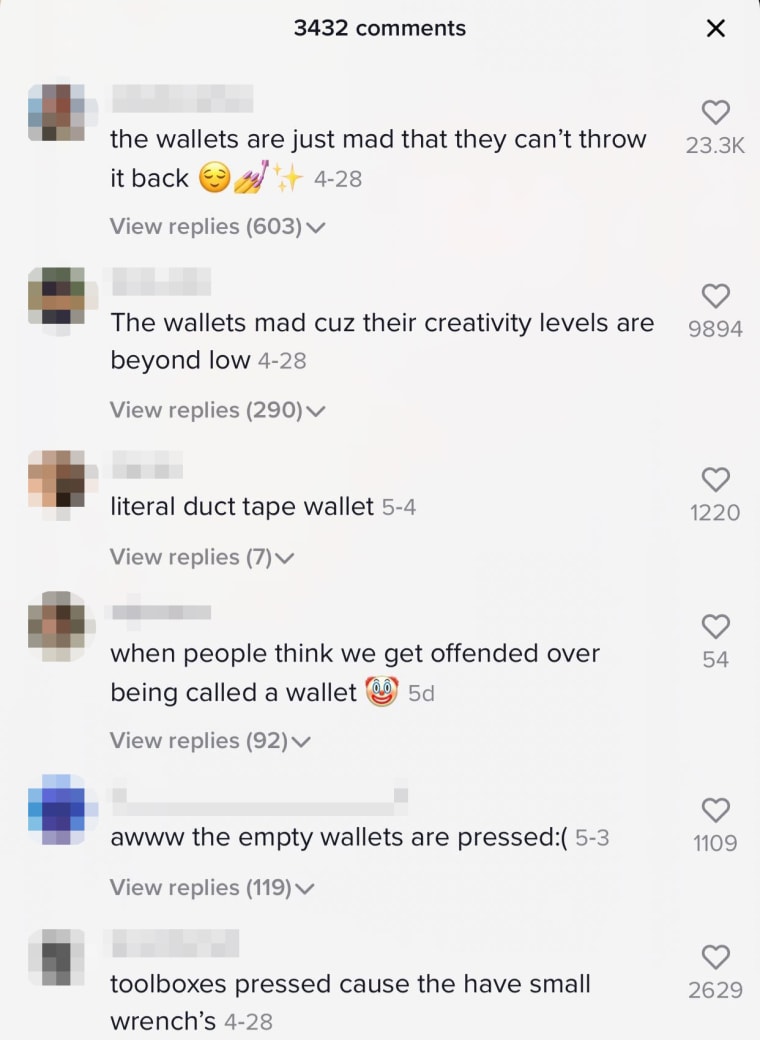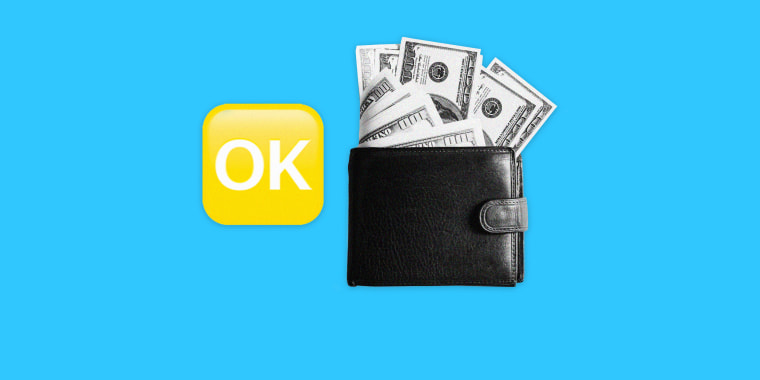Most of the videos on Kit Kriisk's TikTok, where she has a modest 97 followers and paints pictures of dogs, garner few to no comments.
But when she posted a video in late April with the caption "OK wallet," the comments section exploded.
"Ok dishwasher," one comment read.
"THESE FEMINISTS ARE GETTING DUMBER BY THE DAY," said another.
"DishwasHER," someone else wrote.
Kriisk, 20, who lives in York, England, had captioned her video with the phrase "OK wallet" in support of another user, TikTok sensation Haley Sharpe, who had recently gotten a slew of sexist comments for jumping on a trend some said was just for men.
"I posted the video hoping for women to be on my side and for men to see the point I was making," Kriisk said. "I think I have 89 comments, and every single one except for [four of my friends] is from a man saying 'shut up dishwasher.'"
Over the past several weeks on TikTok, "OK wallet" has seeped across the app as a new type of underground movement — one meant to show young men what it feels like to be on the receiving end of objectifying language. When young men refer to young women as "dishwasher" or "sandwich maker" or, in some cases, a sex toy, implying that a woman's place is in the kitchen or the bedroom, young women have been responding with "OK wallet," telling men that, in that case, they're good only for their money.
Men and women often claim that they are joking when they objectify one another. However, the back and forth has created a debate about sexism among Generation Z and whether the phrases are, in fact, meant to be humorous or are an incarnation of misogyny.
Women's studies experts say that language reversals are a standard tool in social movements and that using humor and language like "OK wallet" can be an effective tool in changing minds, although it isn't enough on its own to beget greater change.
"It's effective, but it's never effective on its own as the only strategy, because it fights fire with fire, and so you're stuck within the same parameters," said Kyla Schuller, an associate professor of women's, gender and sexuality studies at Rutgers University in New Jersey.
The start of 'OK wallet'
On TikTok, trends like dances and lip-syncs are almost always linked to audio clips that have gained traction on the app.
The case of "OK wallet" is no different.
More than half a dozen teens and young adults who spoke to NBC News all said they began to see the phrase in late April, and while it's unclear where the term originated, Kriisk said she believes the flashpoint was Sharpe, 17, of Alabama, who goes by @yodelinghaley and has 1.6 million TikTok followers.
"I kind of watched the whole thing unfold in real time," Kriisk said. "YodelingHaley immediately got accused, mainly by men, of ruining the joke and that it wasn't for girls."
Sharpe has been one of the app's stars since she started a wildly popular dance trend for the singer Doja Cat's song "Say So." In mid-April, she posted a video to her second account, @Postysdaughther, dancing to audio of a person saying "Woah! Yankee with no brim," played over part of the song "Don't Matter" by Akon, with the intention of poking fun at TikTokers who seem to be able to make up dance moves to even the most bizarre audio clips, she said.
"It was definitely a joke," Sharpe said. "I wasn't taking it seriously at all. I went to sleep. The video was doing normal, and then I wake up and it's gotten a lot of attention."
Nearly 15,000 people have commented on the video. The visible comments now are almost exclusively from Sharpe's defenders, with a handful of visible comments saying the meme had been ruined by her dancing. However, some comments have been deleted, and according to Kriisk, some of the deleted comments included terms like "dishwasher" to describe Sharpe.
The comments section now overwhelmingly includes men and women referring to the offended men as "wallets."
"A lot of people were commenting ... 'Another woman ruining the meme,' men and women," Sharpe said. "And then I saw the term 'wallet' on there."
Sharpe said she hadn't seen anyone use "wallet" before the video, and it's not a term she uses herself. In fact, the earliest entries in Urban Dictionary that use "wallet" that way were posted in late April, as Sharpe's video gained traction.

"I was sort of blind to the number of people who had these views on women until I posted that video. I really didn't think so many people would be angry at me, I guess. ... Before then I really had never noticed anything sexist against me, but that's just me personally," Sharpe said.
While the comments section filled with vitriol, other users made their own videos in support of Sharpe, using the same audio. Kriisk made a video hoping she would find the same kind of support Sharpe had received. Instead, her often quiet comments section filled with misogynistic comments.
"I felt really empowered looking through the [people using the] sound and seeing all these really famous TikTokers ... saying, like, why are women being attacked for everything?" Kriisk said. "I kind of used this empowerment and thought, 'If I post a video, I'll get the same response.' Obviously that wasn't the case."
A new rebuttal for an age-old issue
On TikTok, the hashtag "#OKwallet" has been viewed more than 471,000 times. The hashtag "#Dishwasher" has been viewed more than 54 million times, although it's unclear how many of those instances refer to the misogynistic use of the word.
The pervasiveness of both terms quickly caught the eye of Jessi Balcom, 20, who joined TikTok a few weeks ago. Already, Balcom said, she's been called a "blender," or a specific kind of sex toy. She's also seen men comment that they wanted to repeal the 19th Amendment, which guaranteed women the right to vote.
Download the NBC News app for breaking news and alerts
And while Balcom said she immediately noticed an onslaught of sexist comments, it wasn't long before she started to see women firing back with "OK wallet."
"I've been really proud of the younger kids of today. I know I'm still young, but I've been really proud of the teenagers of today because of the very smart way they're handling things," Balcom said.
Balcom, who lives in Washington state, said she clued in to the fact that many young people called women "dishwashers" and "sandwich makers" said their comments were made in jest but then bristled at being called "wallets." Eventually, she made two videos calling the men out.
"If you want to play the joke that it's the 1950s and we belong in the kitchen, then when we play that joke back, you would be the wallet," she said.
Ultimately, if men want to make misogynistic jokes, Balcom said, they need to be OK with women joining in.
"These are things that women and young girls have had to deal with for way too much of their lives. ... If it is going to be a joke and a game, we should all be allowed to laugh along," she said.
For others, "wallet" is less a joke and more a conversation starter to help provoke change. Nia Stanford, 18, of New Jersey, created a "wallet" dis track that has been viewed more than 2.2 million times on TikTok.
Stanford, who has seen the word floating around on the app for weeks, said she was inspired to make the song after seeing young women on TikTok attacked by men for innocuous comments and videos.
"I wrote it as a coping [tool]. It's so rampant, the intolerance on TikTok, and I was, like, I just want to do something to say what I'm thinking. ... I tried to hit on a lot of points in my piece," Stanford said.
Some of the young people on TikTok who say they agree with using "OK wallet" to rebut sexism said they still feel it doesn't hold the same venom as something like "dishwasher."
"My honest opinion is that if a person can have a conversation and understand that what they're saying is blatantly sexist, calling them a wallet might be redundant," said Nico Bacigalupo, 22, of Florida, who goes by they/them pronouns.
In some cases, "OK wallet" can be used to rebuff a person who isn't interested in a real conversation about sexist language and is just trolling for the sake of trolling, Bacigalupo said.
"I feel as if a lot of women/feminine-presenting people respond with [OK wallet] as a way to combat the people who don't actually want to create a dialogue about why sexist language is not appropriate," they said.
Others said "wallet" doesn't pack the same blow as "dishwasher," which is rooted in more traditional gender roles.
"I honestly think the phrase is kind of lame, because it's not close to as objectifying as 'dishwasher,'" said Sofia Borén, 19. "But guys still get very triggered by it, which means it works as a catchy response."
Borén made her own video highlighting the names young men call women and how angry men get when the roles are reversed.
"Some guys reacted to my video that 'OK wallet' isn't even an insult, but when I asked why or disagreed, they were really pressed," Borén said. "It's clear that men have mixed emotions about the expression. I'm just scared they're going to use it as an excuse to be even more hateful in their pushback."
But leveling the playing field with language isn't a tactic that began with the teens of TikTok, experts said. The "OK wallet"-style language reversal has been a part of the feminist movement since its early days, said Schuller of Rutgers University.
A movement or a moment?
In the late 1960s, radical feminists held an "ogle-in" on Wall Street.
The ogle-in" a tongue-in-cheek protest, according to Schuller, saw women directing catcalls and wolf whistles at men making their way to work, something the women had frequently been subjected to.
"Having that language applied to them on their way to work was a really powerful strategy of showing men what it felt like to be objectified," Schuller said.
Although the ogle-in was one part of a larger strategy in the feminist movement, its foundation of humor and role reversals shares the same DNA as "OK wallet."
"It's only pretty recently that feminists have been allowed to be funny, and that's a huge shift we've seen in the last five to seven years," Schuller said. Bra burning in the 1960s "was a playful farce, but people don't like to see feminists as funny when they're trying to change social behavior, and what we're noticing is we're still kind of trapped in that."
"OK wallet" doesn't have the historical significance of something like the ogle-in, but TikTok users like Anna Scott, 15, of Hawaii, hope the movement will start a conversation and eventually change how men and women view and treat one another.
"I felt like it shouldn't be taken as an insult. ... It should be taken as an eye-opener that guys shouldn't be treating women this way," she said.
The use of language helps men and women gain perspective on one another, Schuller said, as well as on the gender roles they've been socialized into. It can also help people break free from those gender roles — even if the conversation has a hostile start.
While it takes social, legal and political changes to sustain a movement, conversation — even if it offends — is still a start, she said.
"Conversations that can happen between people, even if they start as trading insults, can potentially be really effective," she said. "Because that's the domain that needs to change — how we relate to other people."


